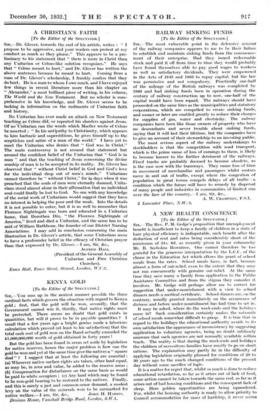A CHRISTIAN'S FAITH [To the Editor of the SPECTATOR.]
Sm,—Dr. Glover, towards the end of his article, writes : I
propose to be aggressive, and your readers can protest at my conduct as much as they please." This appears to be a pre- liminary to his statement that " there is more in Christ than any Unitarian or Celsus-like solution recognizes." He says that " Celsus meant to hurt," and Dr. Glover has written the above sentences because he meant to hurt. Coming from a man of Dr. Glover's scholarship, I frankly confess that they do hurt. He is a man to whom I owe much, and I have enjoyed few things in recent literature more than his chapter on " Alexander," a most brilliant piece of writing, in his volume, Tke World and the New Testament. But no scholar is com- prehensive in his knowledge, and Dr. Glover seems to be lacking in information on the rudiments of Unitarian faith and history.- No Unitarian has ever made an attack on New Testament teachini as Celsus did, or repeated his slanders against Jesus. Of no'TJnitarian can the words which Moeller wrote of Celsus be asserted ; "In his antipathy to Christianity, which appears to him barbaric and superstitious, he gives himself up to the scepticism and satire of a man of the world." I have yet to meet the Unitarian who denies that " God was in Christ." The main controversy is not around that statement but around the confident belief of the Unitarian that " God is in man " and that the teaching of Jesus concerning the divine sonship of man is to be accepted in its reality. Dr. Glover has observed that " without Christ belief in God and God's love for the individual drop out of men's minds." Unitarians cannot therefore be " without Christ," for in days when it was preached that the souls of men were eternally doomed, Unita- rians stood almost alone in their affirmation that no individual soul could finally be lost to God. No one with any knowledge of the social work of Unitarians would suggest that they have no interest in helping the poor and the weak. Into the details it is not possible to enter, but it is as well to remember that Florence Nightingale was born and educated in a Unitarian home, that Dorothea Dix, " the Florence Nightingale of America," lived and died a Unitarian, and the same has to be said of William Rathbone, the founder of our District Nursing Associations. I may add in conclusion concerning the main illustration in Dr. Glover's article, that some Unitarians seem to have a profounder belief in the efficacy of Christian prayer than that expressed by Dr. Glover.—I am, Sir, &e.,
ALFRED HALL (President of the General Assembly of Unitarian and Free Christian Churches).
Essex Hall, Essex Street, Strand, London, W.C.2.






























 Previous page
Previous page